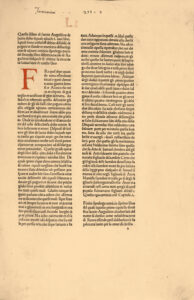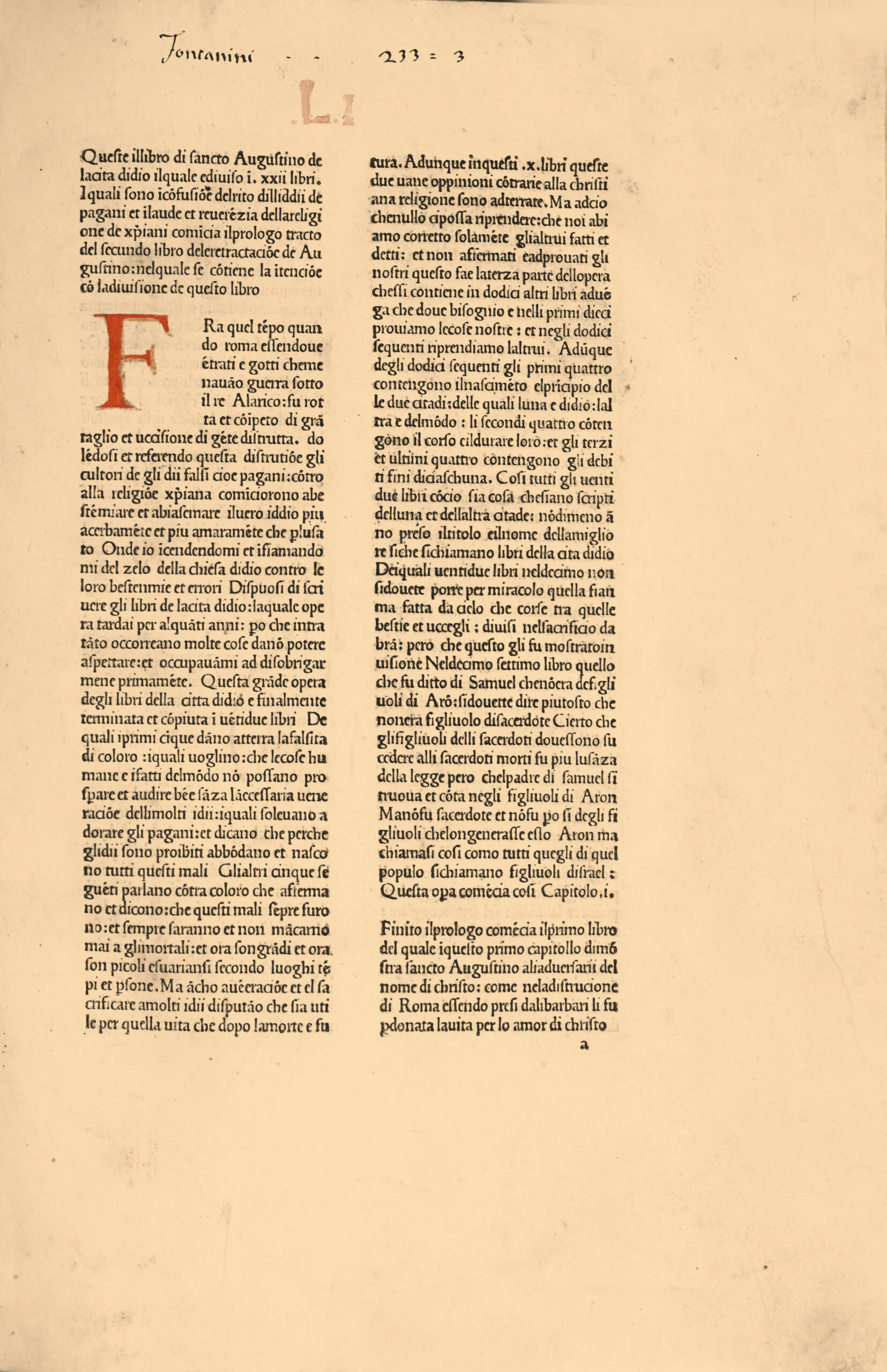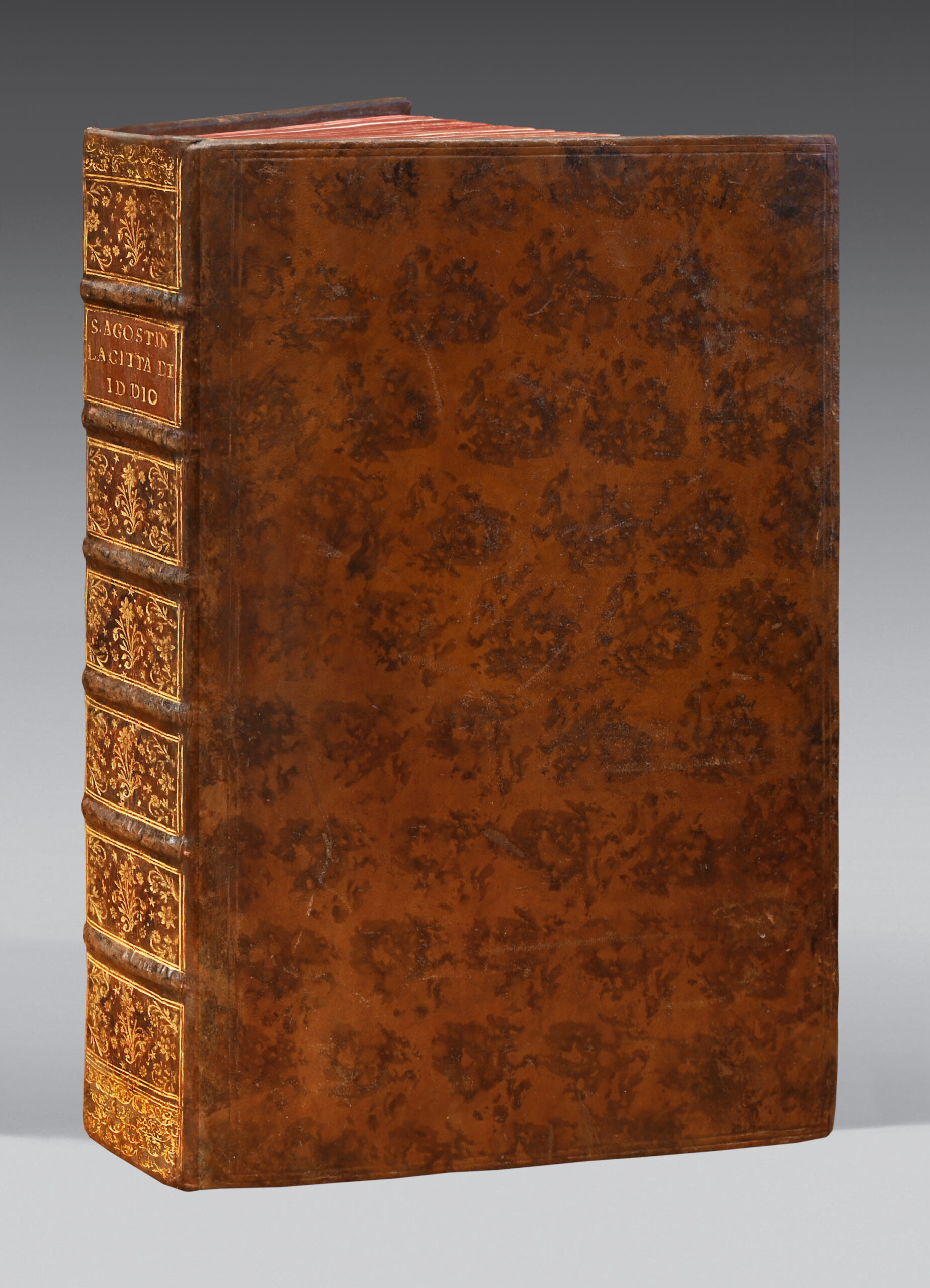Undated. [Venice, Antonio di Bartolommeo Miscomini, 1476-78].
2a. Tauola et capittoli del primo libro || sācto Augnstino de la cita dio. 13a. Queste illibro di sancto Augustino de || lacita didio ilquale ediuiso ī. xxii libri || Iquali sono īcōfusiōe delrito dilliddii de || pagani… comīcia ilprologo tracto || del secundo libro delere-tractaciōe de Au||gustino:… 333b. COLOPHON : DEO GRATIAS. [P]Armi con laiutorio didio ha||uere renduto il debito di que||sta grande opera. Adcui pare troppo : o || adcui pare poco miperdonino. Ma ad || cui basta non adme: ma adio congratu||landosi meco ne rendano gratie. Glo||ria et honore alpadre et al figliuolo et || allo spirito sancto omnipotente idio in || secula seculorum. Amen.
Chancery folio, 322 leaves (of 324, without first and last blank leaves), a12 a-k L m-z10 A-G10 H12, double column, 47 lines, roman type, initial spaces (the first supplied in red, a few others supplied later in brown ink), book number supplied in manuscript at head of each recto (faded), eighteenth-century cat’s-paw calf, spine gilt in compartments with red morocco lettering-pieces, red edges. 18th century binding.
286 x 198 mm.
First edition in Italian of St Augustine’s ‘City of God’, extremely rare.
‘No copies are known’ (Brunet, I, 560-561).
HC *2071; GW 2892; BMC VII, 1136; BSB-Ink A-865; CIBN A-691; Bod-inc A-534; Goff A-1248.
First edition of the only medieval translation into Italian of Augustine’s City of God, traditionally ascribed to the fourteenth-century Florentine Dominican Jacopo Passavanti, and which appeared shortly after the editio princeps of the Latin printed by Sweynheym and Pannartz.
City of God is an apology for Christianity written by St Augustine (354-430) towards the end of his life. It is at once a philosophy of human society in its historical development, a metaphysics of society and an interpretation of individual and social life in the light of the fundamental principles of Christianity. The book was written in response to the accusation made in 410 by the pagans that the sack of Rome, inflicted by Alaric’s Goths, was due to the abandonment of the worship of traditional gods, an abandonment imposed by Christianity. Augustine responded by rejecting the accusation; but first, in order to warn and reassure the Christians themselves, who had not been unmoved and untroubled by this carnage, he explained the true nature of good and evil, and showed how the latter cannot come from external violence, since it originates in the will that submits to temporal goods. The devastation and massacres perpetrated by the Goths did not harm anything of real value; at most, they were a salutary test and an eloquent warning for Christians too attached to earthly goods (Book I).
In his development, Augustine highlighted the apologetic tradition from Tertullian to Origen, reviving it with his vast experience as a thinker and bishop, broadening its perspectives, and turning it into an interpretation of the history of humanity. That is why this history has had a profound influence on every age and on every individual who is curious and concerned about his or her own destiny. This is also why, in the polemics of the Middle Ages between the papacy and the empire, people sought to draw on this work (falsely identifying the city of God with the empirical Church and the city of the world with the concrete state); this is why, from Bossuet to Balbo, all those who turned their attention once again to the problem of history turned to Saint Augustine; this is why, despite the development of theoretical sciences, The City of God is still a living book that never ceases to find readers. It was the first book to be printed in Italy (1467, in Subiaco), and we know that humanism subsequently felt its profound charm, as did the Reformers, Pascal and Kierkegaard.
Many incunable catalogues continue to express uncertainty about whether this edition was printed in Venice or in Florence, and about its date. But the research by Tommaso Accurti and Roberto Ridolfi has established clearly that this edition was printed by Antonio Miscomini in Venice, during the years of his activity there, 1476-78. By 1480, Miscomini had moved to Nonantola, from where he migrated to Florence. During the years of his first shop in Venice he did not use his surname in his colophons, referring to himself as Antonius Bartholomaei, and Antonio da Bologna.
« In quire q the text is almost free from contractions and the pages of the inner opening are short, with a blank space of nearly a column between two chapters.
This book was assigned to Miscomini’s Florentine press by Procter (n° 6145) but is here taken to have been printed by him at Venice because (I) of the numerous watermarks several (scales in circle, large oxhead with shaft ending in cross and rosette, etc.) are characteristically Venetian but none characteristically Florentine ; (2) the heavy a with head curled to left which is occasion-ally found occurs elsewhere only in the Venetian Virgil of ‘1486’, IB. 20447, vol. v, p. 240. The considerations that one of the Bodleian copies belonged to the Jesuates of Venice and that, according to R. Lier & Co.’s Catalogue IX (1926), no. 8, at least two copies in original Venetian bindings are known point in the same direction. On the other hand, the frequent combination of the article with its substantive in one word is rather a Florentine characteristic. Wherever it was printed, the book cannot be later than 1483, as is shown by the inscription in the Bodleian copy : Questo libro e dipoueri Iesuati da uenegia. 1483.
The only well authenticated early edition. » (BMC, VII, 1136).
A very fine copy.
Height 286 mm compared to 241 for the Théordore Low Devinne copy.



